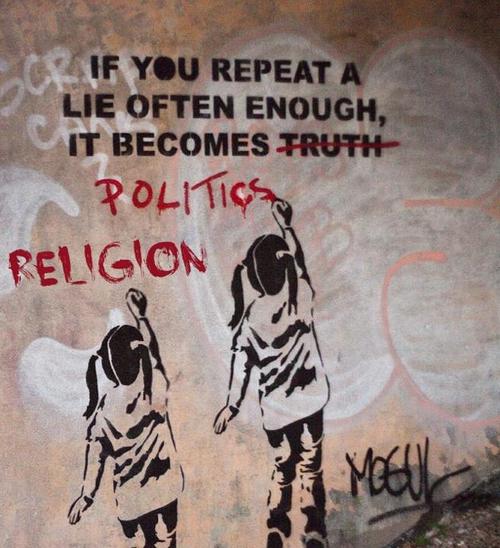 |
| Hey! Those kids are taggers! Stop it right now, you kids! |
But let's be honest. No campaign would employ lies in their campaign in any situation where telling the truth would accomplish their goals. If a candidate has as part of his policy agenda the redistribution of actual ponies, then he might promise every voter that they'd get a pony - and in this case he'd be telling the truth. Instead, candidates and campaigns lie for one of two reasons - either to artificially demonize their opponent, or to conceal unpopular policies or outcomes. If a candidate has as part of his policy agenda the murder of every family's firstborn child, he might promise that the government agents who took that child away to be executed would leave a pony. Now HIS promise that every voter gets a pony is a lie, necessary to cover up the unpopular policy of child murder.
Viewed in this context, a candidate's lies are a very useful barometer. When the campaign lies about its opponent, it is a clear indication that the opponent has done a credible job or is promising to implement some valuable or popular policies, and the only way to tarnish his image in the voter's perception is to invent some bad history or dangerous potential outcomes. And when a candidate lies about his own policies, it is even clearer that he knows that to tell the truth about those policies would be to lose the election. He's making it clear by his dishonesty that he will have to fool the people into electing him so he can then pursue an agenda that will harm them and their interests. So recognizing the lies is important, even if debunking them seems to be beyond the capacity of what remains of American journalism.
With the upcoming debates, it is also important to be attuned to lies of omission, rather than the more typical lies of commission. Virtually every policy the Romney campaign intends to implement is unpopular, destructive, economically counterproductive and/or serves only to disproportionately benefit a small portion of the electorate. So look for both Romney and Ryan, in their debates, to struggle to find gimmicks of obfuscation and mis-direction to attempt to avoid providing any specific details. It is my profound hope that this institutionalized vagueness and ambiguity will be the primary reason for the campaign's failure, but it remains to be seen if the American people are both capable and willing to see it for what it is.
In the end, though, it's important to remember that we can learn almost as much from the lies as we could from the truth. A candidate isn't lying because he's a pathological liar - although, to the extent he can lie smoothly and effectively he may be a better politician - he's lying because he wants to be elected, and has come to the conclusion that the risks of lying outweigh the political costs of honesty, and therefore the more a candidate lies, the more dangerous his governing agenda is likely to be.
...
You can go back a long, long way with in respect to our corrupt media.
ReplyDeleteFor instance, the Hearst and Pulitzer papers's support for the Spanish-American War.
However, the vast majority of Americans did not live in New York City, and the decision-makers who did live there probably relied more on staid newspapers like the Times, The Sun, or the Post.
Note that the decisions made by "the decision-makers" were no doubt influenced by popular opinion, which was influenced by the "non-staid" papers.
~
Well, that's strictly true, but there have been many examples of courageous and important actual journalism since then, the likes of which we simply NEVER see any more.
ReplyDeleteTo say journalism has always been corruptable is true, but American journalism has never been so completely corrupt and utterly co-opted than it is today...
I think it was just as bad, if not worse, in the gilded age, wasn't it?
DeleteMy dad was a journalist, mikey.
DeleteI've made the same point, and you know what he told me?
The NYT with the Pentagon Papers, and the WaPo with Watergate, were exceptions to the rule.
~
Yep.
Deleteit is my understanding that as long as there has been media, it has been corrupt.
ReplyDeleteI suspect Og probably gave the original cave painters extra bear skins to make up successful hunting tales that aggrandized Og.
There were more media outlets though: now there are, what, five?
ReplyDeleteObviously, the collection of a writer must be a bundle of creativity. New ideas of writing become the reason of success. It makes your work worthwhile. Everyone wants to praise your writing because they bound by creativity.cursus fotografie rotterdam
ReplyDelete